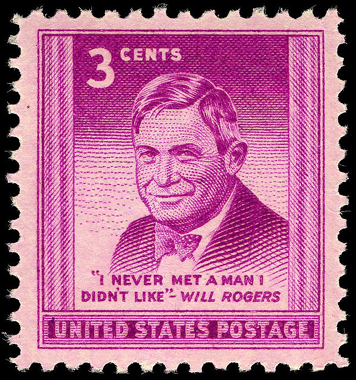“There are three kinds of men. The one that learns by reading. The few who learn by observation. The rest of them have to pee on the electric fence for themselves.”
Will Rogers, who developed into one of America’s favorite celebrities in the 1920’s and 1930’s, didn’t start off well. He fought with his father, dropped out of school after the 10th grade, and went from one venture to another, trying to find something he was good at. As much as he disliked school and studying, he probably had no idea he would wind up entertaining the country with his words.
William Penn Adair Rogers was born November 4, 1879 to a prominent Cherokee Nation family in what was then called “Indian Territory,” and which later became Oklahoma. His father (Clem) was a Confederate veteran, rancher, Cherokee leader, and delegate to the Oklahoma Constitutional Convention. His mother, Mary, was the daughter of a Cherokee chief, and she favored the softer side of life; including music, literature, etiquette, and good humor.
Will’s mother died when he was 11, and he and his siblings were left to be raised by their busy father. Will wanted to be a cowboy, which seemed like a more exciting life than being a student, and he stopped going to classes mid-way through high school. He worked for years as a cowboy and showman – moving from Oklahoma to Argentina, South Africa, Australia, and New York. He developed skills as a trick roper and entered show business in a wild-west circus and on vaudeville.
Hollywood discovered Will in 1918, and Samuel Goldwyn gave him a three-year contract. Will appeared in 48 silent movies and 21 “talkies” with such noted performers as Boris Karloff, Myrna Loy, Mickey Rooney, and Bill “Bojangles” Robinson.
Eventually, Will discovered that audiences liked to hear him talk as well as do rope tricks, and he developed a stand-up comedy routine, making wry comments on daily news stories. He toured the lecture circuit, entertaining audiences with his views on politics and life, and he began to influence the country’s viewpoints. Some of Will’s readers looked to him for political analysis as well as humor. If Rogers liked a politician, much of the country liked him, too, and eventually, some elected officials had their staff arrange meetings with Rogers, so they could get on his “good side.” Will was a frequent guest at the White House, and he became a friend to U.S. Presidents Warren Harding, Calvin Coolidge, and Franklin Roosevelt. Once when visiting President Harding, Rogers asked, "'Morning, Mr. President! Would you like to hear the latest political jokes?" Harding replied, "You don't have to, Will. I appointed them."
In 1928, Will parodied the presidential campaign by announcing that he, Rogers, was running for president on behalf of a group he called the Silent Majority – the name that had been used to describe Calvin Coolidge’s following. Rogers explained in Life magazine a major difference between him and the other candidates: “But those other fellows want to live in the White House, and in order to get there, they will promise anything from perpetual motion to eternal salvation.” Will made only one promise – “If elected, I will resign.”
Rogers was famous for his use of language, using slang and inventing new words to fit his needs. He used “ain’t,” for example, referred to men as “old boys,” and often said he was busy “blathering” (talking), or that he was “tickled” by something he saw. Some of his lines were droll; he wrote, for example: “Everything is funny, as long as it’s happening to somebody else.”
Will’s witty observations were often turned into quotes; including: “Even if you’re on the right track, you’ll get run over if you just sit there.” Another was his advice for getting along with women: “There's two theories to arguing with a woman. Neither one works.” And he poked fun at the people of his first and last home states: “When the Okies left Oklahoma and moved to California, it raised the I.Q. of both states.”
Will had a way of putting things that made sense to people. He wrote, for example, about how to prevent war: “I have a scheme for stopping war. It’s this – no nation is allowed to enter a war till they have paid for the last one.”
Perhaps none of his writings made Will Rogers more famous than his Daily Telegrams. Syndicated in more than 500 newspapers, these short daily columns reached millions of readers throughout the country. First published in the New York Times in 1926 and continuing until Rogers’ death in 1935, they shaped public opinions, impacted government policies, and influenced peoples’ perceptions. Readers were known to read Will’s Daily Telegram each morning before the rest of the newspaper.
Will wrote his Daily Telegrams from wherever he happened to be at the moment. His last few columns were written in Alaska, which hadn’t yet become a state.
On a fateful day in August of 1935, at age 55, Will Rogers thought he was simply going out for another adventure with his friend, Wiley Post. Before climbing into the small plane behind Post, Will sat down at his typewriter and wrote a column about the Alaska Rural Rehabilitation Corporation, the U.S. government’s attempt to kick-start an agricultural business in Alaska by relocating unemployed families from the Midwest to Alaska.
It turned out to be Will Roger’s last column. Shortly after take-off, the plane that was carrying Wiley Post and Will Rogers crashed in the shallow waters of a lake near Point Barrow. Both men were killed.
Will Rogers left behind a vast legacy. He had entertained the country for 20 years, and he had met and poked fun at every major politician. But more important, he had provided a chuckle for everyone who saw him, heard him, or read his column. He had become larger than life.
Not bad for a high school dropout from Oklahoma.

